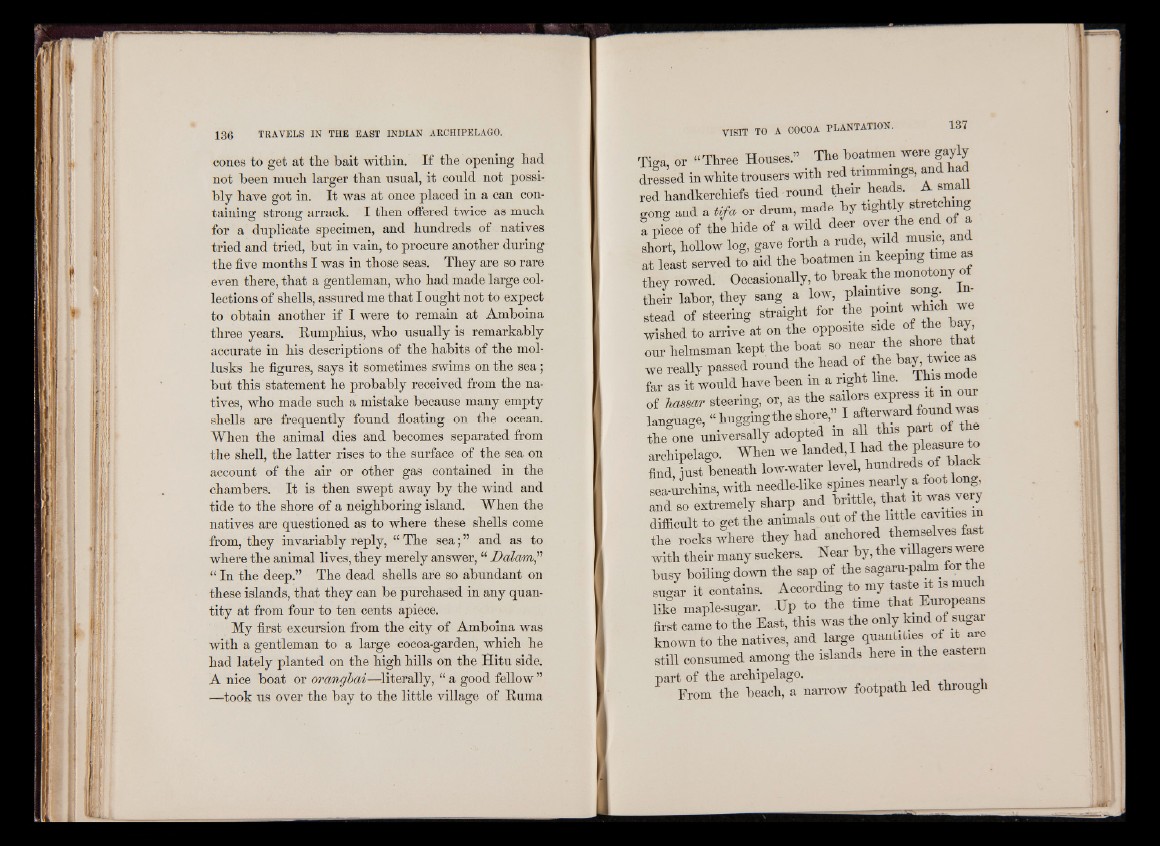
cones to get at the bait within. If the opening had
not been much larger than usual, it could not possibly
have got in. It was at once placed in a can containing
strong arrack. I then offered twice as much
for a duplicate specimen, and hundreds of natives
tried and tried, but in vain, to procure another during
the five months I was in those seas. They are so rare
even there, that a gentleman, who had made large collections
of shells, assured me that I ought not to expect
to obtain another if I were to remain at Amboina
three years. Rumphius, who usually is remarkably
accurate in his descriptions of the habits of the mol-
lusks he figures, says it sometimes swims on the sea;
but this statement he probably received from the natives,
who made such a mistake because many empty
shells are frequently found floating on the ocean.
When the animal dies and becomes separated from
the shell, the latter rises to the surface of the sea on
account of the air or other gas contained in the
chambers. It is then swept away by the wind and
tide to the shore of a neighboring island. When the
natives are questioned as to where these shells come
from, they invariably reply, | The sea;" and as to
where the animal lives, they merely answer, “ Dalam,”
“ In the deep.” The dead shells are so abundant on
these islands, that they can be purchased in any quantity
at from four to ten cents apiece.
My first excursion from the city of Amboina was
with a gentleman to a large cocoa-garden, which he
had lately planted on the high hills on the S itu side.
A nice boat or orcmgbai—literally, “ a good fellow ”
—took us over the bay to the little village of Ruma
Tiga or “Three Houses.” The boatmen were gayly
d ris e d in white trousers with red trimmings, <md had
red handkerchiefs tied round their heads. AsmaU
gong and a Ufa or drum, made by tightly stre A i g
I piece of the hide of a wild deer over the end of a
short, hollow log, gave forth a rude, wild music,
at least served to aid the boatmen in keeping time
they rowed. Occasionally, to break the monotony of
their labor, they sang a low, plaintive song In-
stead of steering straight for the point vhichwe
wished to arrive at on the opposite side of the b y ,
our helmsman kept the boat so near the shore that
we really passed round the head of the b aytw ice as
far as it would have been in a right line. This mode
of la ssw steering, or, as the sadom «pre»s i tm o m
language “ bugging tbe sbore,” I afterward found was
th^^ne universally adopted in all this part of the
arebipelago. Wben we lauded, I bad tbe Ple^ e
find, just beueatb low-water level, buudxeds of
sea-urchins, witb needle-like spines nearly a foot long,
I X extremely sharp and brittle, that xt was very
difficult to get tbe animals out of the little cav
tbe rocks where they bad anchored themselves fast
witb tbeir many suckers. Hear by, tbe villagers were
busy boiling down tbe sap of tbe sagaru-palm for the
sugar it contains. According to my taste it is much
like maple-sugar. -Up to the time that Europeans
first came to tbe East, this was tbe only kind of sugar
known to tbe natives, and large quantities ot it are
still consumed among tbe islands here in tbe eastern
part of tbe archipelago.